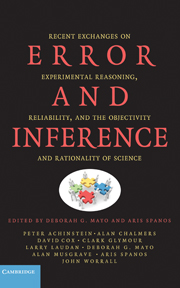 Error and Inference
Error and Inference Published online by Cambridge University Press: 29 January 2010
In this chapter I address what seems to be a sharp difference of opinion between myself and Mayo concerning a fundamental problem in the theory of confirmation. Not surprisingly, I argue that I am right and she is (interestingly) wrong. But first I need to outline the background carefully – because seeing clearly what the problem is (and what it is not) takes us a good way towards its correct solution.
The Duhem Problem and the “UN” Charter
So far as the issue about confirmation that I want to raise here is concerned: in the beginning was the “Duhem problem.” But this problem has often been misrepresented. No sensible argument exists in Duhem (or elsewhere) to the effect that the “whole of our knowledge” is involved in any attempt to test any part of our knowledge. Indeed, I doubt that that claim makes any sense. No sensible argument exists in Duhem (or elsewhere) to the effect that we can never test any particular part of some overall theory or theoretical system, only the “whole” of it. If, for example, a theory falls “naturally” into five axioms, then there is – and can be – no reason why it should be impos-sible that some directly testable consequence follows from, say, four of those axioms – in which case only those four axioms and not the whole of the theory are what is tested.
To save this book to your Kindle, first ensure [email protected] is added to your Approved Personal Document E-mail List under your Personal Document Settings on the Manage Your Content and Devices page of your Amazon account. Then enter the ‘name’ part of your Kindle email address below. Find out more about saving to your Kindle.
Note you can select to save to either the @free.kindle.com or @kindle.com variations. ‘@free.kindle.com’ emails are free but can only be saved to your device when it is connected to wi-fi. ‘@kindle.com’ emails can be delivered even when you are not connected to wi-fi, but note that service fees apply.
Find out more about the Kindle Personal Document Service.
To save content items to your account, please confirm that you agree to abide by our usage policies. If this is the first time you use this feature, you will be asked to authorise Cambridge Core to connect with your account. Find out more about saving content to Dropbox.
To save content items to your account, please confirm that you agree to abide by our usage policies. If this is the first time you use this feature, you will be asked to authorise Cambridge Core to connect with your account. Find out more about saving content to Google Drive.